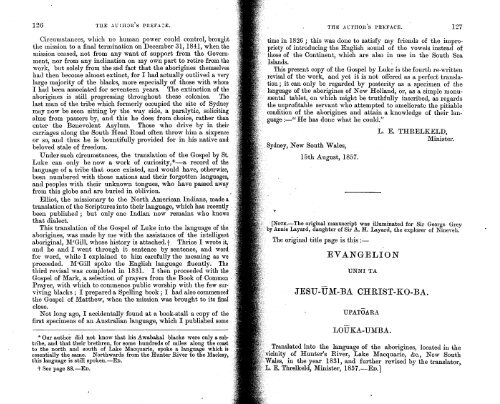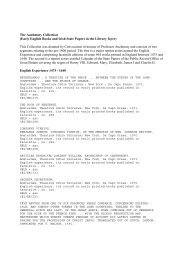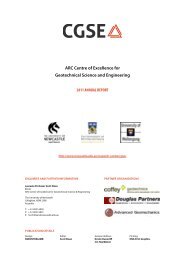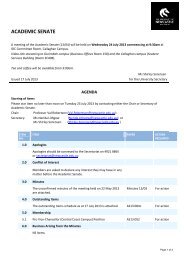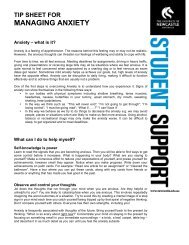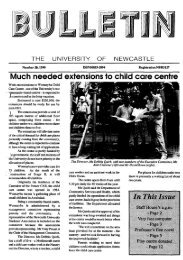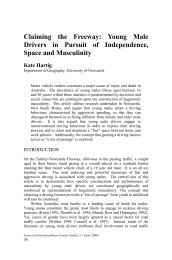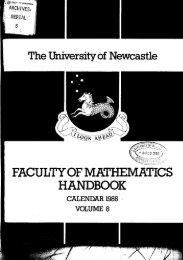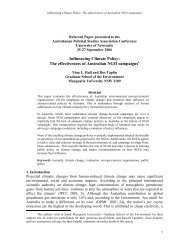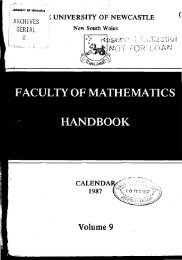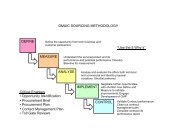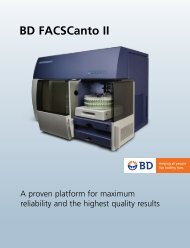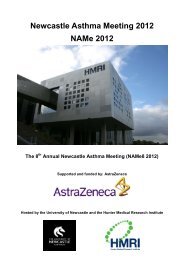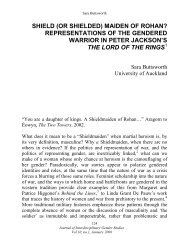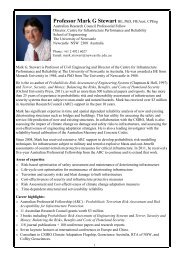n - University of Newcastle
n - University of Newcastle
n - University of Newcastle
Create successful ePaper yourself
Turn your PDF publications into a flip-book with our unique Google optimized e-Paper software.
1'76 TEE LUIII~IL'S PGEFA2E. THE A UTIIO~I'S PREFACE. 127<br />
Circumstances, ~\~llic!~ 110 human power could control e in 1826 ; this was clone to satisfy my friends <strong>of</strong> the improthe<br />
mission to a final termination on December 31, 1841, lety <strong>of</strong> introducing the English sound <strong>of</strong> the vowels imtcacl <strong>of</strong><br />
nlission ceased, not from any want <strong>of</strong> support from the se <strong>of</strong> the Continent, which are also in use in the Sout,li Sea<br />
ment, nor fi-om any inclination on my own part to reti<br />
work, but solely from the sa.d fact that the aborigines This present copy <strong>of</strong> the Gospel by Luke is the fourth re-written<br />
hail then become almost extinct, for I had actually outlived a very revisal <strong>of</strong> the work, ancl yet it is not <strong>of</strong>fered as a perfect translalarge<br />
majority <strong>of</strong> the blacks, more especially <strong>of</strong> those with whom tion ; it can only be regarded by posterity as a specinlen <strong>of</strong> the<br />
I had been associated for seventeen years. The extinction <strong>of</strong> the language <strong>of</strong> the aborigines <strong>of</strong> New Holland, or, as a simple monuaborigines<br />
is still progressing tl~ronghout these colonies. The nlental tablet, on which might be truthfully inscribed, as regmcls<br />
last man <strong>of</strong> the tribe which fornlerly occupied the site <strong>of</strong> Sydne the unpr<strong>of</strong>itable servant who attempted to ameliorate the pitiable<br />
may now be seen sitting by the way side, a paralytic, solic condition <strong>of</strong> the aborigines and attain a knowledge <strong>of</strong> their lanalms<br />
from passers by, and this he does from choice, rather guage :-" He has clone what he could."<br />
enter the Benevolent Asylum. Those who drive by in<br />
carriages along the South Head Road <strong>of</strong>ten throw him a six<br />
or so, and thus he is bou~ltifully provided for in his nativ<br />
beloved stale <strong>of</strong> freedom.<br />
dney, New South Wales,<br />
Under such circumstances, the translatio~l <strong>of</strong> the Gospel by St. 15th August, 1857.<br />
Lnke can only be now a work <strong>of</strong> curiosity,*-a record <strong>of</strong> the<br />
language <strong>of</strong> a tribe that once existed, and would have, otherwise<br />
been numbered vith those nations and their forgotten langua<br />
and peoples with their unknown tongues, who have passed a<br />
frotn this globe and are buried in oblivioll.<br />
Elliot, the nlissiona~y to the North American Indians, made<br />
translation <strong>of</strong> the Scriptures into their language, which has recent1<br />
been published ; but only one India11 no^ remains who knows<br />
L. E. THRELKELD,<br />
I!l.inistec<br />
that dialect.<br />
This tra~lslation <strong>of</strong> the Gospel <strong>of</strong> Luke into the language <strong>of</strong> the<br />
aborigines, was made by l~le with the assistance <strong>of</strong> the intellige<br />
aboriginal, IlCGill, whose history is attached. i- Thrice I wrote i<br />
No~x.-The original manuscript was illuminated for Sir George Grey<br />
Annie Layard, daughter <strong>of</strong> Sir A. H. Layard, the explorer <strong>of</strong> Xincreh.<br />
The original tit,le page is this :-<br />
and he and I went through it sentence by sentence, and w<br />
for word, while I explained to him carefully the meaning a<br />
EV-4NGELION<br />
proceeded. MLGill spoke the English language fluently.<br />
thircl revisal was completecl in 1831. I then proceeded wi<br />
Gospel <strong>of</strong> Mark, a selection <strong>of</strong> prayers froni the Book <strong>of</strong> Co<br />
UNNI TA<br />
Prayer, with which to commence public worship with the fe<br />
viving blacks ; I prepared a Spelling book ; I had also cornmenc<br />
the Gospel <strong>of</strong> Matthew, when the nlission was brought to its fin<br />
JESU-UM-BA CHRIST-KO-BA.<br />
close.<br />
UPATGRA<br />
Not long ago, I accidentally found at a book-stall a copy <strong>of</strong> the<br />
first specimens <strong>of</strong> ail Australian language, which I published some<br />
" Onr anthir did not know that his Awabakal blacks were only a<br />
tribe, and that their brethren, for some hundreds <strong>of</strong> miles along the c<br />
to the north and south <strong>of</strong> Lake Maccluarie, spoke a language mhic<br />
LOEKA-UMBA.<br />
Translated into the language <strong>of</strong> the aborigines, locatecl in the<br />
essentially the same. Northwards from the Hunter River to the Mac1 cinity <strong>of</strong> Hunter's River, Lake Macquarie, kc., New South<br />
this language is still spoken.-ED. ales, in the year 1831, and further revised by the tran~lato~<br />
t See page sS.-ED. E. Threlkeld, Minister, 1 857.-ED.]


